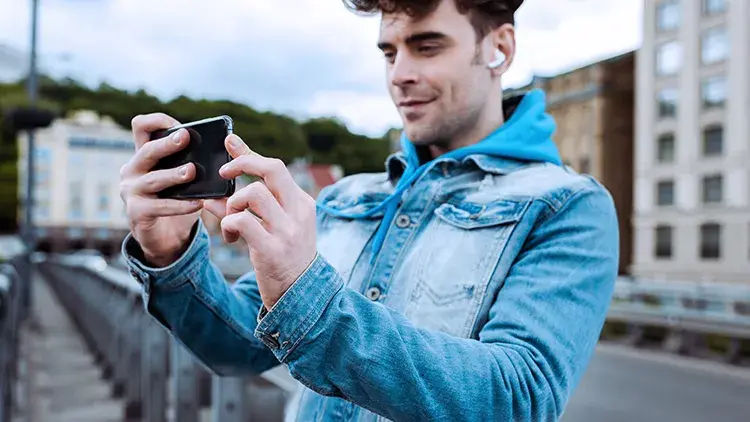Smile, you're on my cellphone: Camera phones and privacy
The Video Voyeurism Prevention Act was passed in Congress to prevent invasions of privacy. What does this mean? It means you have some rights.
Get help with your legal questions
Excellent

by Deborah Ng
Deb Ng is a freelance writer and published author with over 17 years of experience in creating content for the web. P...
Contents
Updated on: April 4, 2024 · 3 min read
- The downside of camera phones
- What is the Video Voyeurism Prevention Act?
- Can someone take your picture without your permission?

Camera phones have been sources of both amusement and convenience. Instead of having a bulky digital camera in your purse or back pocket, these picture-taking devices allow for spontaneous photo ops. Since almost everyone has been in a situation where they wish they had a camera, you can only imagine the market for these convenient little cameras. Now, your whole trip to Europe can be documented via camera phone as you pose atop the EiffelTower or in front of the Tower of London.
But for all of their convenience, camera phones aren't always a good thing. Now that cameras are so discreet, they're being used for more than candid shots. This has created an ever growing list of places where camera phones are unwelcome.
Schools are banning camera phones because students are using them to photograph tests and cheat. Courthouses are outlawing them to protect undercover police officers who can be photographed while testifying. Businesses like General Motors, Intel, and Lockheed Martin are nixing camera phones as well. Such employers are afraid of James Bond-style espionage, in which employees might take photos of confidential documents and sell them to third parties. And it gets worse.
The downside of camera phones
Thanks to camera phones, a new age of voyeurism is here. News networks have uncovered camera phones being used to watch the unsuspecting undress in gyms, department store dressing rooms, locker rooms, and tanning salons.
These people are having their photos snapped without their knowledge or permission. To compound the problem, many of the unapproved photos are "up the skirt" or "down the shirt" shots where the photographer strategically aims the camera. The victim leaves none the wiser. These pictures are often posted on the internet. In fact, pornographic mobog (mobile blogging) websites exist specifically for this purpose. In almost all cases, the photos are used without the subject's permission.
What is the Video Voyeurism Prevention Act?
The Video Voyeurism Prevention Act prohibits the photographing or videotaping of a naked person without his or her permission in a gym, tanning salon, dressing room or anywhere else where one expects a "reasonable expectation of privacy." Violators can expect fines of up to $100,000 and/or up to a year in prison.
Can someone take your picture without your permission?
This doesn't necessarily make it illegal for someone to snap your photo without your permission though. For instance, if you're just walking down the street and someone takes a picture, they're well within their rights no matter how violated you might feel. But if someone takes a picture of you without your permission while you're getting ready to shower at the gym, it's against the law. This law isn't limited to camera phones but also includes camcorders, cameras, and digital cameras.
Hopefully, this will make you a little more secure about using that department store dressing room. While the law is there, enforcing it is a whole different matter. First of all, you have to know your picture is being taken. The person taking the photograph can be pretending to be talking on the phone or doing something else. This means you have to be positive your privacy is being violated. If you're not aware you're being photographed, your picture can still end up on the internet. Unless you happen to stumble across it, you'll be none the wiser. Even if you do find it, you can take action, but finding the photographer may not be easy.
Camera phones are intended to be a convenient way to take and share spur of the moment photos with friends and family. And there's nothing wrong with that. Like anything else though, people have to proceed with caution. Never take photos of people without their permission, and try to be aware of your surroundings. If you see someone taking your photo without your permission, it's your right to ask him or her to stop. If you're undressed and someone is taking your photo, put in a call to the police. Not only are you making sure your rights are intact, you're also making the dressing room a little safer for the rest of the world.
You may also like
 Starting a Business
Starting a BusinessHow to Get an LLC and Start a Limited Liability Company
Considering an LLC for your business? The application process isn't complicated, but to apply for an LLC, you'll have to do some homework first.
October 3, 2024 · 11min read
 Power of Attorney
Power of AttorneyWhat Is a Power of Attorney (POA)? A Comprehensive Guide
A power of attorney can give trusted individuals the power to make decisions on your behalf—but only in certain situations.
August 29, 2024 · 20min read